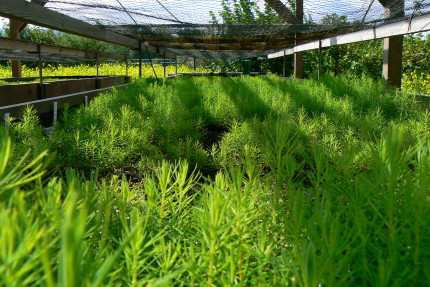Seeds without borders
SUSTREE offering timely solutions
Key strategies
It can be expected that global temperatures will increase up to 4 degrees within the next 100 years. Adaptive silvicultural practices are therefore required to sustain the forests’ ecological and economic functions. New approaches are making use of alternative tree species or species mixtures, in order to rely on the full adaptive capacity of Central-European trees. The utilisation of forest reproductive material from warmer regions of the tree species distribution is expected to buffer the forests' stability against temperature changes.
At present the regions of tree provenances, seed use and transfer legislations are regulated mainly on a national level. Forest reproductive material is marketed within countries and transnational transfer is rare. Information on tree provenances and reproductive material is often available only in national languages and databases are in most cases not accessible for international users.
This creates problems in conservation and management of endangered genetic resources and for efficient tree breeding.
Key for an improvement of conservation strategies is therefore international collaboration and knowledge exchange. Forest managers, researchers and policy makers are working together to develop timely solutions to enhance a transnational tree seed transfer and to guarantee adaptive management methods.
Finding answers
Firest efforts as the Forest Reproductive Material (Forematis) database, the European information system on forest genetic resources (EUFGIS) or the European Forest Genetic Resources Programme (EUFORGEN) are good examples of changing perceptions and projects dealing with forest genetic diversity. SUSTREE therefore builds upon existing networks and research results. But still a lot has to be done!
SUSTREE Project
SUSTREE brings together eight partner institutions of six countries within Central Europe to investigate on possibilities to improve seed transfer in times of climate change. The project is divided in three thematic work packages. SUSTREE is overseen and managed by the Austrian Research Centre of Forests, Vienna.
- Work-package number 1
“Harmonization of tree genetic resource use and transfer adapted to changing climate conditions”
Lead partner: National Agricultural Research and Innovation Centre (NAIK ERTI), Hungary
In a first approach the current seed transfer guidelines are studied, to identify the criteria and scientific basis of forest genetic diversity. In order to create species distribution models, existing data on forest trees and soils will be harmonized of the involved countries. The knowledge on climatic limits of seed transfer will be aggregated from the exisiting provenance experiments, to develop provenance delineation and seed transfer models for the changing climate. - Work-package number 2
“Transnational access to forest genetic resources and building a policy for sustainable use of forest reproductive material”
Lead partner: Bavarian office for forest seedling and planting (ASP), Germany
A transnational database to facilitate seed transfer in Central Europe will be developed. During informative workshops experiences will be shared and advise will be given to the target groups, for example seed legislation authorities and policy makers of the project countries.
- Work-package number 3
“Promoting climate change adaption for forest ecosystems by implementing new seed transfer models with forest companies and conservation mangers as pilot application”
Lead partner: Czech university of Life Sciences Prague (CULS), Czech Republic
The lead partner will closely work together with forest companies and nature conservation parks in Central Europe to implement pilot actions of the SUSTREE project. The objective is to test the vulnerability of genetic resources in nature conservation areas and forests at the European scale. Tools for practitioners will be developed for everyday use. The findings on transnational delineation and seed transfer models will supply a Smartphone and web-app for forest managers.

Further reading
waldwissen.net - Information for forest management
European Forest Genetic Resources Programme (EUFORGEN)
European information system on forest genetic resources (EUFGIS)
EU Directive 1999/105/EC
Forest Reproductive Material (Forematis)
